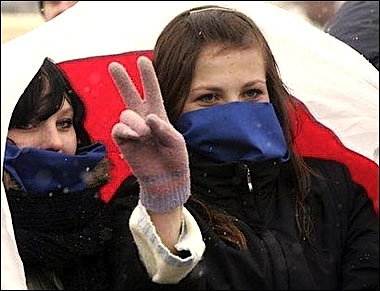Education used as weapon against young people in Belarus
MINSK - Anastasia Shuleika was expelled from Belarus State University on 14 February for speaking out against President Alexander Lukashenko.
The rector of the university is Sergei Vladimirovich Ablameiko. His name is one of 208 officials banned from traveling into the EU. He allegedly gave her name to the KGB, who took care of the rest.
Shuleika's story is far from unique. Since 2006, around 700 university students have shared a similar fate. Some have ended up in jail.
The youth in this country, closed off from most of the world, cannot speak their minds freely and in open. In many cases, people simply dream of leaving.
One of them is Dmitry Bulanov. He also spoke out against Lukashenko and took part in the post-election-rigging protests on 19 December 2010, kicking over a police barrier.
He says he almost died in prison last May. He is still under surveillance and must report to police every week for the next five years.
He is also banned from pursuing his music studies at university and lives at home in his mother's flat on the seventh floor of a large Soviet-era residential building on Minsk's outskirts.
From his room, he stares out over a city which has come to symbolise his lost dreams. He now hopes to move to Poland with his girlfriend. "There is no future for me in Belarus," he told this reporter in November.
His mother's anger against the state is almost palpable - Dmitry is her only child.
Less than 200 km away in Vilnius, about 2,000 Belarusian students attend the European Humanities University (EHU). Its rector, Arsenij Mikhailov, set it up in 2006 when Belarus closed down his school in Minsk. He is well into his seventies and cannot return to his home country.
Darya Trus, a 22-year-old EHU student told this website that "Belarus authorities didn't like the idea of academic freedom and of visiting EU professors ... they closed the school in Minsk in 2005 on the pretext that it did not have a physical fitness programme." She added: "In Belarus you are forced to take courses on ideology and professors tell you what is good and what is bad. [You study] propaganda."
Her degree at EHU will be recognised everywhere in Europe except in her native country.
Meanwhile, other young people in Belarus continue to kick against the regime and to suffer the consequences.
Nasta Palazhanka has been in and out of jail since she was 16. Now 22, she is one of the leaders of Youth Front, a movement which aims to re-awaken a society which has been traumatised by almost two decades of repression.
Like Dmitry Bulanov, she too is out on bail, but her activism has cost her brother his job at the bank, twice. Her father in 2007 also lost his job. Last year, he suffered a heart attack when he learned she would return to prison.
Palazhanka and many like her try to keep a low profile and organise events in secret through social media. Her interview with this reporter was arranged in a secret location with the blinds drawn to keep away prying eyes. She is often followed.
The EU recently blacklisted Luidmila Iganatovich-Mishneva, a prosecutor who sentenced two activists from Nasta's Youth Front to prison.
The trial - say EU countries - was a farce. One of those convicted, 24-year-old Eduard Lobov, will now spend the next four years of his life in a high-security penal colony. His friend, Zmitser Daskevich, will serve two years. Both are charged with "hooliganism."
"Due to continuing concerns regarding the deterioration of human rights, democracy and rule of law the [blacklist] was updated several times in the course of 2011," EU foreign affairs spokeswoman Maja Kocijancic told EUobserver back in Brussels.
In March, the EU took a new step of imposing economic sanctions on two Lukashenko-linked oligarchs and 29 companies. It remains to be seen if the measures will have any positive impact on the lives of ordinary people in the country, however.
In the meantime, for Palazhanka and for thousands of others, the stark realities which have defined their entire adult lives remain the same.
"A person who walks this path [opposition] should understand that their families will also suffer. Hundreds of people have sacrificed their careers and their health," she said.
By Nikolaj Nielsen, www.euobserver.com


















